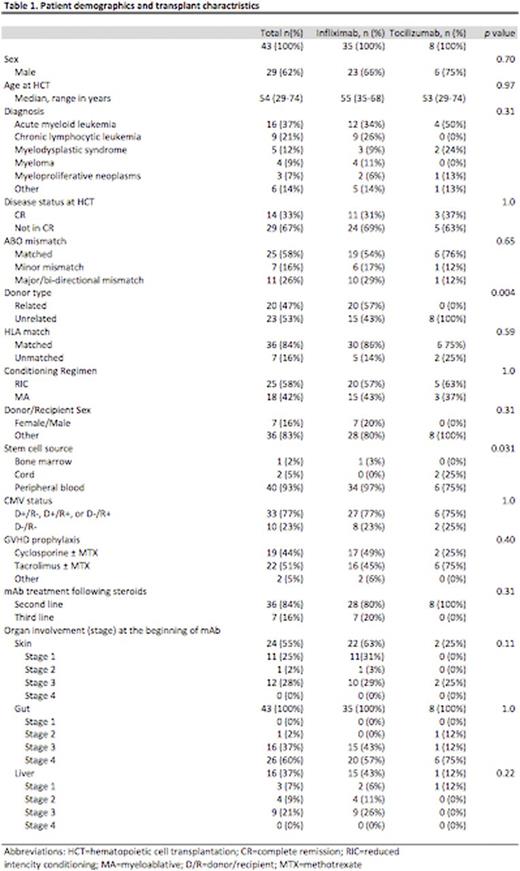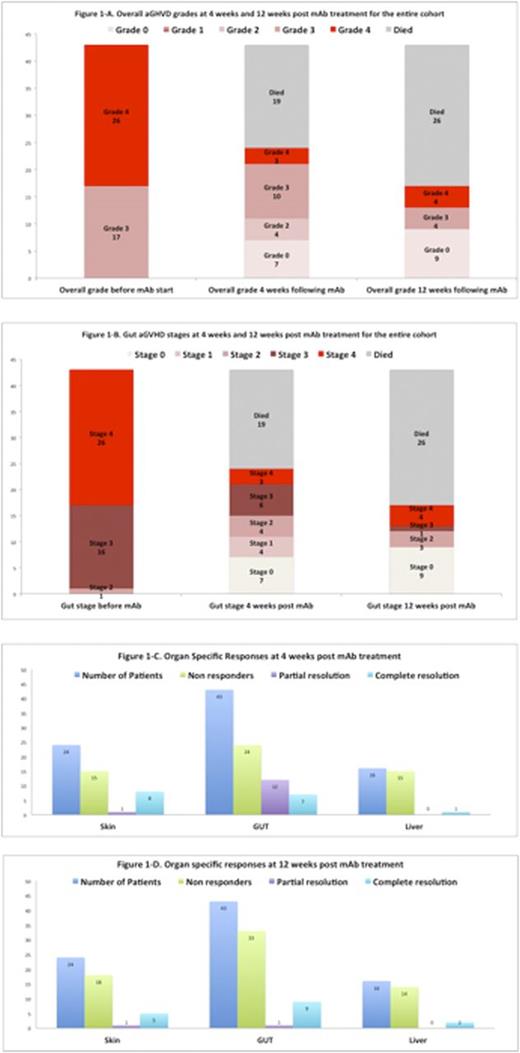Abstract
Background: Acute graft versus host disease (aGVHD) is the leading cause of morbidity and mortality following allogenic hematopoietic cell transplantation (HCT). Corticosteroids are the first line treatment although <50% of patients with severe aGVHD (grades III-IV) achieve durable remissions. Monoclonal antibodies (mAb) are often used as second line agents for steroid refractory aGVHD (SR-aGVHD) (Patriarca et. al.; 2004). However, data regarding their tolerability and efficacy is retrospective and limited. We carried out this study to assess the clinical outcomes related to mAb therapy (Infliximab and Tocilizumab) for SR-aGVHD.
Methods: Patients with SR-aGVHD that received therapy with either Infliximab or Tocilizumab between January 2003 and May 2016 were retrospectively identified. Clinical grading of aGVHD was per the Glucksberg criteria (Glucksberg et. al.; 1974). SR-aGVHD was defined as any grade progression within 3 days or failure to achieve at least one grade improvement within 7 days of initiation of systemic steroids. Infliximab and Tocilizumab were administered intravenously at 10mg/kg and 8mg/kg weekly for a total of 4 doses, respectively. Clinical response was evaluated at 4 weeks and 12 weeks post mAb treatment. Complete response (CR) was defined as sustained resolution of all clinical signs of aGVHD; partial response (PR) was defined as overall improvement of 1 or more grades; no response (NR) was defined as neither improvement nor worsening of the overall aGVHD grade. Overall response (OR) was defined as either CR or PR. Overall survival (OS) was calculated from the first day of mAb treatment until death or last available follow up.
Results: Forty-three patients (median age 54, range 29-74 years; male 67%) with severe SR- aGVHD were included in the study. Of these, 35 (81%) received Infliximab for a median of 4 (range 1-6) cycles and 8 (19%) received Tocilizumab for a median of 3 (range 1-4) cycles. Both groups were comparable with regards to age, gender, conditioning regimen, graft source, degree of HLA match, ABO blood group, CMV incompatibility, and GVHD prophylaxis regimens. Only differences seen were a higher proportion of unrelated donor (p = 0.004) and cord blood HCT (p = 0.031) in the Tocilizumab group. Twenty (57%) of 35 patients treated with Infliximab and 6 (75%) of 8 patients treated with Tocilizumab had an overall aGVHD grade of IV prior to initiation of mAb therapy (p = 0.44). Organ specific distribution and severity of aGVHD are described in table 1.
At 4 weeks post mAb therapy, 17 (40%) patients had an OR, 7 (16%) had no response, and 19 (44%) had died. Twenty-six (60%) patients died at 12 weeks, with OR and no response observed in 9 (21%) and 8 (19%) patients, respectively (table 2). Overall response for Tocilizumab versus Infliximab was comparable at 4 weeks (38% vs. 40%; p = 1.0) and at 12 weeks (38% vs. 17%; p = 0.33). Outcomes per aGVHD grade and gastrointestinal-specific stage at 4 weeks and 12 weeks are shown in figures 1-A and 1-B, with organ specific responses shown in figures 1-C and 1-D, respectively. The estimated median OS was 41 (range 4-3837) days for patients treated with Infliximab and 60 (range 10-756) days for those treated with Tocilizumab (p = 0.48). Disease relapse occurred in 5 (11%) patients treated with Infliximab and in none (0%) treated with Tocilizumab (p = 0.56).
Thirty-four (79%) patients had infectious complications during and up to one month after mAb therapy. These included 31 (72%) patients with bacterial blood stream infection and 10 (23%) with invasive fungal infections. Overall, infectious complications were comparable (Infliximab - 83% vs. Tocilizumab - 63%; p = 0.33). CMV reactivation occurred in 11 (31%) and in 2 (25%) patients who were treated with Infliximab and Tocilizumab, respectively (p = 1.0). Given the retrospective nature of the study and the concomitant presence of aGVHD, it was difficult to attribute and grade gastrointestinal and hepatobiliary side effects.
Conclusions: The use of anti-inflammatory monoclonal antibody therapy in patients with steroid refractory acute GVHD is associated with significant infectious complications (~80%) and poor response rates (~20% at 12 weeks). Current data, limited by a small sample size, does not show any advantages of using Tocilizumab over Infliximab or vice versa. Prospective clinical trials addressing this question are needed.
No relevant conflicts of interest to declare.
Author notes
Asterisk with author names denotes non-ASH members.




